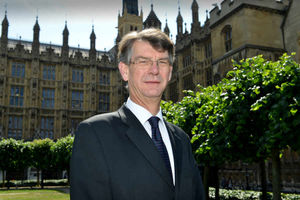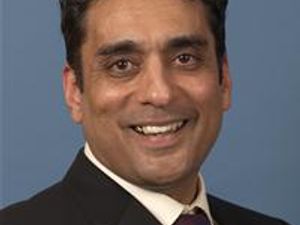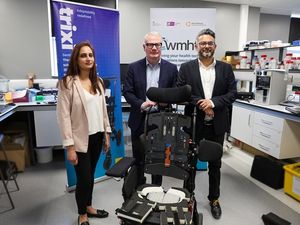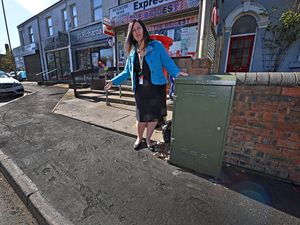Assisted dying bill: An open letter to Wolverhampton MP Rob Marris
Thirty-six religious leaders from Wolverhampton and the West Midlands have today sent an open letter to Wolverhampton South West MP Rob Marris, expressing their objection to his assisted dying bill, which will be debated in the Commons next week.

Dear Rob,
Your Private Members' Bill proposes to allow doctors to prescribe and administer drugs to prematurely end the lives of 'terminally ill' patients.
We appreciate that at the heart of your Bill is the desire to reduce undue suffering in the last days of peoples' lives. Although this is a noble aim we believe the Bill will introduce far worse consequences for our society in the years to come.
What is dignity?
Before examining the arguments, let's begin with the word most associated with assisted suicide and euthanasia – dignity. The pro-euthanasia lobby do not have a monopoly on the word dignity! They persistently claim that the assisted death of a terminally ill person is somehow more dignified than that of the person who dies naturally. It is an attempt to apply emotional pressure on us all to permit assisted suicide lest we should be viewed as heartless and uncaring. It seeks to portray the death of someone who in any way suffers as somehow 'undignified', something we should be ashamed of permitting.
But what is dignity? At its heart dignity means 'worth' or 'respect'. It has a moral component. Dignity is therefore measured by the way we actively treat people. An assisted suicide is not a more dignified end to life than one which has taken its natural course. It is we; it is society itself that endows a person with dignity regardless of their health or sickness, not by bringing their life to an end.
Who is protected?
The main argument for your Bill is predicated on the basis that the law as it stands is being broken by anyone helping the terminally ill to die and that those who do so deserve to be protected by the law. The fundamental principle that they are breaking is that all human life is valuable and should not be taken away.
To quote Judge Robert Rolf's adage, 'Hard cases make bad law'. The law as it stands values every life as intrinsically worthy of our protection. In seeking to offer a means of ending the life of a tiny minority who wish to claim that right, your Bill does the opposite. It legally protects the practitioners of assisted dying and removes legal protection from those who most need it; the sick, the weak, the disabled. They are immediately deemed of less value than the rest of us. That is why your Bill has been opposed by every disability group in the country. Those who have given their lives to help the needy and disabled, some of the very people you say you want to help, have emphatically stated that they believe this is wrong. They more than anyone understand the implications of your proposals and it is their voice you should be listening to.
Good intentions, bad consequences
You are extremely confident that the safeguards proposed in your Bill will be sufficiently robust to prevent any loosening of the terms of assisted suicide. But in practice such 'treatment creep' will be inevitable. As Dr Karel Gunning, a Dutch General Practitioner, states: "Once you accept killing as a solution for a single problem, you will find tomorrow hundreds of problems for which killing can be seen as a solution." Where legislation similar to your Bill has been introduced, for example in Oregon in 2013, the common reasons given for ending the individual's life have been very broad 93 per cent cited 'loss of autonomy', 89 per cent 'loss of enjoyment of life' and 73 per cent 'loss of dignity'.
There are other examples where removal of the legal protection of life has led to tragic and unforeseen consequences. Euthanasia for 'extreme cases' was first introduced in the Netherlands in 2002, but year by year it has been practised on more and more individuals, now including people with dementia and depression. In Belgium euthanasia for terminally ill children of any age was legalised in 2014, through the administration of a lethal injection. Doctors in Belgium are now ending the lives of an average of five people a day by euthanasia, 27 per cent more than the previous year. At the time this legislation was introduced in these countries, the prospect of such outcomes was dismissed in the same way that warnings about your Bill are being today.
In a recent letter to one of us you dismissed this evidence as 'a red herring'. But your Bill on assisted suicide shares two crucial features with these laws on Euthanasia on mainland Europe; firstly it removes the historic protection of the law at the end of life and secondly, it changes the role of the medical profession on whom we have trusted to heal and care, to now include participating in the taking of life.
Unwelcome pressure
Your Bill will introduce very unhealthy tensions between patients and their carers.
Patients will feel the need to give in to unwanted pressure to end their lives from family and carers, most obviously because of financial concerns or a sense of being a burden. In a recent study in Washington in 2013, 61 per cent of those who chose the assisted suicide route cited the reason for doing so was because they felt themselves to be a burden to their family. Assisted suicide introduced the notion of a life less worthy of continuing. On the carer's side there is the very real risk of complicated grief, where a sense of relief is mixed with guilt and 'what ifs'. Dr Edward Trudeau's aphorism surely still stands: "To cure sometimes, to relieve often, to comfort always." Genuine care is the strongest natural elixir to promote hope-filled life. Such an opportunity to care is terminated the moment the fateful final solution is administered.
Measuring life expectancy
There are inherent dangers in seeking to measure how 'terminal' 'terminal' really is. Your Bill makes provision for a terminally ill patient to take their life if the patient, 'as a consequence of that terminal illness is reasonably expected to die within six months'. The body at times demonstrates a remarkable ability to recover. Whilst generally, in the case of terminally ill patients, this doesn't mean that they are cured, nonetheless they can regain useful and even normal living for far longer than might have been anticipated and where the focus is on physical function they might be regarded as being 'normal'. What a terrible thing it would be to deny somebody this possibility, which neither the patient or the carers and doctors thought possible. Society is quick to grasp the concept of there being "just a few months of life left", but those in the medical profession know how different the reality is.
Palliative Care
In your article in the Express & Star (August 6 2015) you make the astonishing claim that the introduction of assisted suicide would 'put pressure on local authorities to improve palliative care so that patients have a real alternative to assisted dying'. That is like saying it would be good to set some houses on fire in order to improve the efficiency of the fire service. We find this a very disturbing argument for someone to make. Why promote death in order to encourage life? The fact is modern palliative care is already very effective at alleviating suffering of the terminally ill and is improving all the time through the dedication of those who value end of life care, not by the practice of assisted suicide.
Life is sacred
Finally as Christian ministers we believe that life itself is sacred and that the law as it stands supports that belief. A change in the law would dishonour God's gift of life and lead into all sorts of unfortunate consequences for which we will be held responsible by a just God. Yes, we will all die, but our role is not to shorten life but protect it for its duration. We also believe that physical death itself is not the end. Through his own death on the cross Jesus Christ holds out the prospect of eternal life to all who believe and trust in him. To deny this truth is to believe that our present existence is the sum total and we are masters of our own destiny – the dismal claim at the heart of assisted suicide. As ministers in the city of the MP proposing the bill, we have no choice but to speak out for the many who disagree strongly with it and feel endangered by it.
Rev Adrian Argile, regional ministry team leader, Heart of England Baptist Association; Rev Steve Faber, Moderator-Elect of the West Midlands Synod of the United Reformed Church; Rev John Howard, chair of Wolverhampton & Shrewsbury Methodist District; Bishop David McGough, Roman Catholic bishop for Wolverhampton; Pastor Emmanuel Kapofu, International Life Centre, Horseley Fields; Rev Richard Merrick, Holy Trinity, Heath Town; Rev Dr. Ian Poole, acting Rector Bushbury Parish; Rev Jonathan Somerville, Tabernacle Baptist Church, Wolverhampton; Pastor Simon Taylor, Christian Life Centre, Blakenhall; Pastor Steve Uppal, All Nations Christian Centre, Wolverhampton; Pastor Tony Wastall, Lifespring Church, Chapel Ash; Rev Robert Carter, St Aidans Church, Penn; Rev Anthony Henson, Grace Church, Wolverhampton, part of Catalyst/Newfrontiers; Rev Jeremy Oakley, St Philip's Church, Bradmore; Rev Carl Rudd, St Joseph's Church, Merry Hill, Wolverhampton; Rev Sue Walker, Minister of Lea Road Community Church (URC); Rev Philip Robertson, St Jude's Church, Wolverhampton; Rev Gareth Regan, St Philip's Church, Bradmore; Pastor Ivy Kapofu, International Life Centre, Horseley Fields; Rev Pippa Goldring, Holy Trinity, Heath Town; Rev Samuel Leach, St Alban's Wednesfield; Rev Alan Vincent, Life Groups of Chorley Chapel,The Scotlands and Wednesfield; Pastor Terry Wilkes, Windmill Community Church, Castlecroft; Pastor David Coates-Smith, Lifespring Church, Chapel Ash; Rev Hannah Colk, Tabernacle Baptist Church, Wolverhampton; Rev Preb Ben Whitmore, St Bartholemew's Church, Penn; Rev Tim Mullings, Tettenhall Wood United Reformed Church; Fr Brendan Carrick, St Anthony's Catholic Church; Pastor Cassius Francis, Wesleyan Holiness Church Wolverhampton; Rev Graham Smith, Church of the Good Shepherd, Low Hill; Bishop Llewellyn Graham, Jubilee Christian Centre; Rev Bill Mash, Team Leader Black Country Urban Industrial Mission; Pastor Leon Etten, Potter's House Church, Wolverhampton; Pastor John Price, Kingsway Church, Wombourne; Mr John Beckett, Penn Christian Centre and Bishop Theophilus McCalla, Gloucester St Church.




